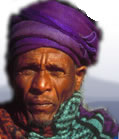 |
 |
||
 |
|||
|
RELATED THEMES family life identity spiritual beliefs OTHER LOCAL THEMES BACKGROUND |
history
Military exploits during campaigns against neighbouring regions formed part of the family history traditionally passed on down the generations. Nowadays, according to several narrators, young people are no longer interested in hearing about these. One narrator (Ethiopia 14), who moved from the lowlands to the highlands, emphasises that it is important to tell her children about their kinsmen in case they are victimised and need family protection. However, the traditional custom of informing the young about their family lineage is dying out since land is no longer inherited from relatives, and thus people's knowledge of family history and of kinship is apparently diminishing. The older generation remembers the Italian occupation during World War II and the violence that took place as the country was forcibly brought under Italian rule. The reign of Emperor Haile Sellassie, which followed, is spoken about nostalgically by some narrators, as being a time of peace and relative prosperity. Others recognise that there was no equality under Haile Sellassie and speak approvingly of the popular uprising that led to his overthrow and the redistribution of land that took place under the Derg (military regime 1974-89). One narrator (Ethiopia 21), referring to the civil war between the Derg and the opposition movements, describes the time of the Derg as one of "endless war". Relatively few narrators, however, say much about the fighting, possibly because the subject is not specifically raised by the interviewer, or perhaps because only some parts of the Meket region were directly affected by the conflict. Those who do, refer to conscription, heavy casualties among the men who went away to fight, and people being forced to flee; few narrators mention an allegiance to one side or the other. Some mention women's participation in the fighting, which led to them "being regarded as equal to men". Comments on the current government, the Ethiopian People's Revolutionary Democratic Front (EPRDF), relate to its role in the development of the area and are generally fairly favourable, although one narrator (Ethiopia 4) says it seems to be oblivious to the current famine. Some mention is made of religious history and the founding of the many churches and monasteries in the area. quotes about history"In 1937, I had an Italian teacher in Desse at the Negus Michael School. She used to tell us to study well and wait for the Italians as they would come to our country. Our people say the Italians killed us, but they also brought wonders. The way I see it, if the Italians had stayed a little longer, many of our children would have made a lot of achievements." "During the time of Haile Sellassie it was peaceful and there was no civil war. Things went bad later on. In those days a merchant travelled through the wild land, passed the night under the light of the moon, and came back safely after completing his business." "In the name of equality both the young and the old are well dressed. There are plenty of clothes around, but there is very little to eat. In the days of Haile Sellassie, people knew their station in society and wore accordingly, with the clothes of the big and the small reflecting their social status." |
|